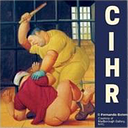EncroChat Part 1: Encrypted messaging in Criminal Investigation and the less Cryptic Issue of Privacy Rights
In this blog post, Doctoral Research Assistant Joya Ferrell analyzes the recent case of European law enforcement seizure of the data from the encrypted chat app EncroChat and advocates for a balance of privacy rights and human rights in light of need for innovative tools for law enforcement.
For a deeper dive into the issues surrounding AI and German criminal procedure, please see Dr. Carsten Momsen’s white paper for the CIHR on implications and limitations of AI on criminal procedure in Germany.
EncroChat: Encrypted messaging in Criminal Investigation and the less Cryptic Issue of Privacy Rights
Criminal justice systems around the world continually face the same recurring conflict: how can the state’s investigative mandate be reconciled with the defendants’ human rights?
Naturally, an investigation must occur prior to any indictment, which bears practical challenges of meeting the demands of the rule of law in light of human bias. This is where questions of profiling and predictive policing become prevalent, often clashing with privacy rights. Most recently, this has surfaced in the EU — particularly in Germany and France — concerning the messenger app EncroChat.
The messenger service had originally started out as an encrypted chat app (with no target audience). Because the encryption was considered particularly bug-proof, it gradually became the primary means of communication between criminals, particularly in the area of organized crime.
Prominently, one of the most recent verdicts of Berlin’s Regional Court rules in favor of admitting contents delivered via EncroChat as evidence to a criminal trial.
In the underlying case, which occurred in March 2020, French authorities had forwarded EncroChat evidence obtained in a joint search-and-seizure operation with the Dutch to German officials for criminal investigation. Following the EncroChat data analysis, an investigation was instigated against Unknown in Germany: subject to that investigation were all EncroChat users and no specific suspects. Official documents reveal there is the concrete suspicion that users of encrypted messenger services do so in order to plan crimes, particularly when it comes to drug trafficking, money laundering, capital crime, fraud and corruption. A debate ensued whether the obtaining of the evidence had been illegal and to what extent it could be admitted to court for evidence; yet, apart from the details of the singular case, this touches upon the overarching theme of safeguarding privacy rights, and, ultimately, human rights, as technology advances. One standard may not fall short of the other.
The EncroChat investigation in Europe demonstrates the danger of the mere existence of the EncroChat app on a mobile phone leading to the owner or user of said device to become subject to criminal investigation. On the other hand, particular attention must be paid to matters of profiling, with specific demographic groups being subjected to such investigations more often. This is yet another facet of how the use of artificial intelligence in the criminal justice system may exacerbate racial biases in the investigative apparatus. This can snowball into cornering these groups through means of predictive policing; while predicting future crimes is a vital safety measure, human rights stand as the safeguard to police the police.
While EncroChat may be associated with organized crime, jumping to conclusions not only exposes the fragility of privacy rights and data protection, but also overlooks two vital aspects: one, popular messenger apps such as WhatsApp or Facebook messenger also use end-to-end encryption and, secondly, encrypted messaging may be favored for other privacy reasons, i.e. any discussion of sensitive matters, may they be legal, financial or simply personal.
No matter how automatized or digitized criminal investigation becomes as technology advances, they remain products of a human mind. This reminds once more of the significance of the right enshrined in Article 11 of the UDHR: The right to be presumed innocent until proven guilty. Human bias can direct investigations away from the neutrality criminal justice requires. While faith in the rule of law is indispensable, being aware of certain risks and having means at hand to protect human rights in case of infringements is paramount to all areas of criminal justice.
